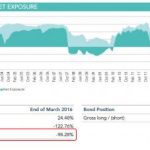
Western Digital (NASDAQ: WDC) shares are up more than 15% over the last couple of days after the HDD manufacturer announced that China’s Tsinghua Holding Company’s Unisplendour, or simply Unis, will pay $92.50 per share (33% premium to Sept. 30th close), for a 15% stake, consisting of newly-issued Western Digital stock. Although such a huge new share offering would normally lead to a considerable selloff due to the attendant share dilution, WDC shares have been making strong gains because the deal involves a five-year lock-up on the shares, during which time Uni’s stake in WDC is supposed to remain above 10% to guarantee a board seat for the Chinese company. The deal will raise $3.78 billion cash for WDC, which the company said ”will facilitate our growth as we look to capitalize on the many opportunities and changes within the global storage industry.”
Western Digital 5-Day Share Returns

Source: CNN Money
So what’s Western Digital’s game plan here? While WDC has over the years been making significant storage acquisitions, the company rarely issues new shares as part of a merger. The last time the company went down this road was back in 2011 when it acquired Hitachi Global Storage Technologies, or HGST, for $3.5 billion cash and $750 million worth of common shares. The Unis deal, therefore represents the largest share-for-merger deal for Western Digital.
Meanwhile, the storage industry was up strongly in sympathy with the WDC deal. Shares of Micron (NASDAQ:MU), the chip manufacturer that Tsinghua is interested in acquiring, are up 12% while shares of SanDisk (NASDAQ:SNDK), a major flash storage player, are up 18%. Interestingly, share of rival HDD maker, Seagate Technology (NASDAQ:STX), remained almost unchanged.
Upping the flash game
Although WDC was rather ambiguous and refused to let the cat out of the bag regarding why it is making such a large share offer deal, we can try and make some deductions. Companies often offer new equity when their debt obligations get out of hand and they find themselves paying too much debt interest, or when their free cash flow position deteriorates so much that they are unable to comfortably finance their operations. In the case of Western Digital, none of these possible scenarios seems to apply. The company’s debt-to-equity ratio of 0.28 is much lower than the tech sector average of 0.44.














Leave A Comment